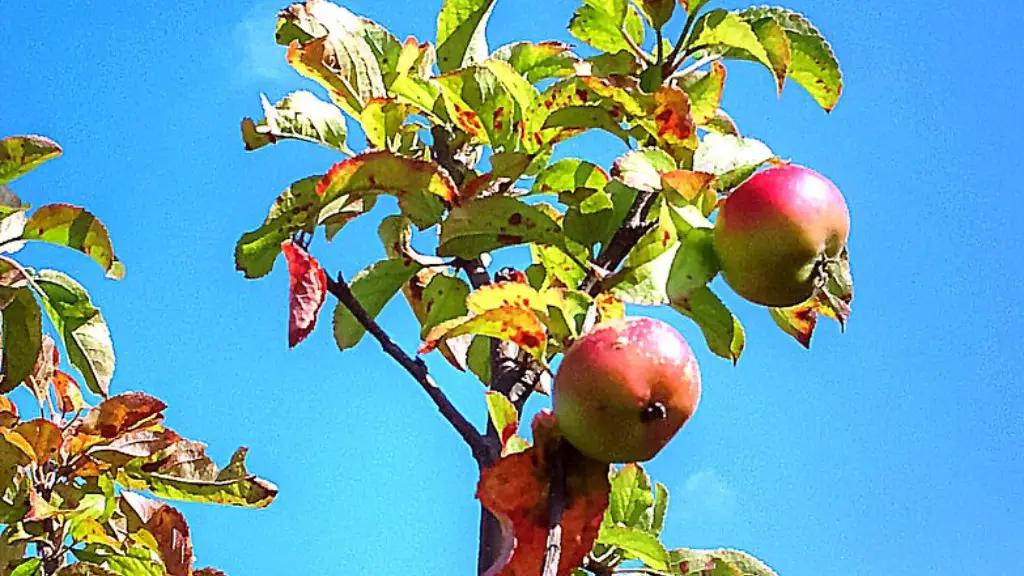When it comes to apple trees not producing apples, there are a number of common causes. Most of these can be solved quite easily, and this article will discuss why an apple tree may not be producing, and suggest a few common remedies to fix the issue.
Biological Factors
One possible reason why an apple tree is not producing apples is biological. There are a number of possible biological reasons why fruit production could be hindered. Understanding these is the key to rectifying the issue. Firstly, the tree may not be old enough, or may be too old. Secondly, a tree may produce too much fruit at once, which can lead to it being ‘exhausted’ for a season or two. Thirdly, it may not have been pollinated. Lastly, bad weather, such as an unseasonably cold winter or even too much rain or not enough rain during the summer months, can lead to a tree not producing apples.
Environmental Factors
Another possible reason for a tree not producing apples can be its environment. If a tree is situated in an inappropriate location, with not enough sunlight, then it will struggle to produce apples. Furthermore, if the soil isn’t right, the tree’s roots won’t have enough nutrients to fuel itself and hence the production of apples will be affected. Other environmental factors include urbanisation, pollution and even too much wind.
Fungal Issues
Fungal problems can also contribute to a tree not producing apples. Fungal diseases, such as fireblight, woolly aphid, cedar-apple rust and black rot, can all lead to a tree not producing apples, as these infections disrupt the tree’s hormonal balance, making it harder for it to produce fruit.
Insects
Insects are another common problem. Insects such as aphids, mites, scale, fruitworms, and even certain types of ants can all eat away at the flowers and foliage of a tree, making it hard for the tree to reproduce.
Chemical Factors
Chemical factors are another likely cause. The soil that the tree is planted in can sometimes be enriched with chemicals that disrupt the pH balance. Furthermore, chemical insecticides and herbicides can also affect the ability of an apple tree to produce fruit.
Nutritional Deficiencies
Nutritional deficiencies can lead to a tree not producing apples. If the tree is deprived of compounds such as nitrogen, calcium, magnesium or zinc, it won’t be able to reproduce fruit due to a lack of sustenance.
How To Fix The Issue
If the issue is biological, then the tree may just need some time to rest and rebuild its strength. If the issue is environmental, then the tree may need to be transplanted to a more adequate location. If the issue is related to chemical or nutritional deficiencies, then the soil should be tested and amended with the necessary nutrients and compounds. Lastly, if the issue is with insects, then chemical insecticides should be used to tackle the problem. Additionally, natural predators, such as ladybugs, can be used to fight off certain types of insect.
Preventative Measures Against Future Problems
To help prevent future problems, a few preventative measures can be taken. Firstly, care should be taken to ensure that the tree is planted in an appropriate location, with enough sunlight and good soil. Furthermore, regular applications of good, nutrient-rich fertilisers can help maintain a healthy tree. Additionally, the tree should be regularly monitored and inspected for pests and diseases. If any issues are found, then they must be quickly addressed and treated. Lastly, a good pruning schedule should be established to promote the healthy growth of branches and foliage.
Crop Management Practices
Good crop management practices are also essential to ensure a successful harvest each season. This includes thinning out excess apples, as too many can lead to them competing with each other for resources, resulting in smaller and more discoloured fruit. Additionally, another important management practice is keeping the tree well-watered and mulched at all times to help reduce water stress during summer months. Lastly, crop management practices also include the use of organic insecticides and fungicides, as these can be effective in keeping pests and diseases at bay.
Monitoring The Maturity Of Apples
Regularly monitoring the maturity of the fruit is also important. To assess the degree of maturity, a variety of methods can be used, such as; tapping, pressing or even puncturing the apples. Ripe apples should yield a positive response to these tests. Furthermore, the colouring and texture of the apples can also be used to assess maturity and can provide a good indication as to when they are ready to be picked.


